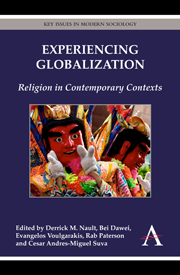Book contents
- Frontmatter
- Contents
- Preface
- Chapter 1 Introduction
- Part One Religion in Global and Transcultural Perspective
- Part Two Comparative and Pluralistic Approaches
- Chapter 5 Mary, Athena and Guanyin: What the Church, the Demos and the Sangha Can Teach Us about Religious Pluralism and Doctrinal Conformity to Socio-cultural Standards
- Chapter 6 The Globalization of the New Spirituality and its Expression in Japan: The Case of Mt Ikoma
- Chapter 7 Globalization and Religious Resurgence: A Comparative Study of Bahrain and Poland
- Part Three Religion in Taiwan
- List of Contributors
Chapter 7 - Globalization and Religious Resurgence: A Comparative Study of Bahrain and Poland
from Part Two - Comparative and Pluralistic Approaches
Published online by Cambridge University Press: 05 May 2013
- Frontmatter
- Contents
- Preface
- Chapter 1 Introduction
- Part One Religion in Global and Transcultural Perspective
- Part Two Comparative and Pluralistic Approaches
- Chapter 5 Mary, Athena and Guanyin: What the Church, the Demos and the Sangha Can Teach Us about Religious Pluralism and Doctrinal Conformity to Socio-cultural Standards
- Chapter 6 The Globalization of the New Spirituality and its Expression in Japan: The Case of Mt Ikoma
- Chapter 7 Globalization and Religious Resurgence: A Comparative Study of Bahrain and Poland
- Part Three Religion in Taiwan
- List of Contributors
Summary
Religious Revival: Primary Considerations
The role of religion in state politics has grown more significant in modern times, and religious revival (considered as a single phenomenon) has arguably become the most important characteristic of the post-Cold War era. This worldwide increase in religiosity has been studied and documented by a number of scholars, including Martin Riesebrodt (1990), Mark Juergensmayer (1993) and Lester Kurtz (1995), among others. A combination of factors, such as the rejection of modernity and secularism, as well as concerns with safeguarding local culture and identity, underlie religious resurgence. All of the factors mentioned above are closely linked to the concept of globalization, a process which should not be oversimplified. Globalization threatens religious traditions yet has simultaneously contributed to religious revival thanks to the spread of information and communication technologies (ICT). It is also important to assess religious resurgence from geographic and demographic perspectives. The phenomenon of religious revival has been observed not only in developing nations but also in the USA (Bacevich and Prodromu 2004) and to a lesser extent in Europe (excluding Muslim immigrant communities). However, the success of Polish populist religious parties is unique. Poland, a member of the European Union, is unusual even among other Central European post-communist countries (Grün 2008) insofar as no other EU member country has had fundamentalist religious parties gain such influence in politics.
- Type
- Chapter
- Information
- Experiencing GlobalizationReligion in Contemporary Contexts, pp. 129 - 150Publisher: Anthem PressPrint publication year: 2013
- 2
- Cited by



